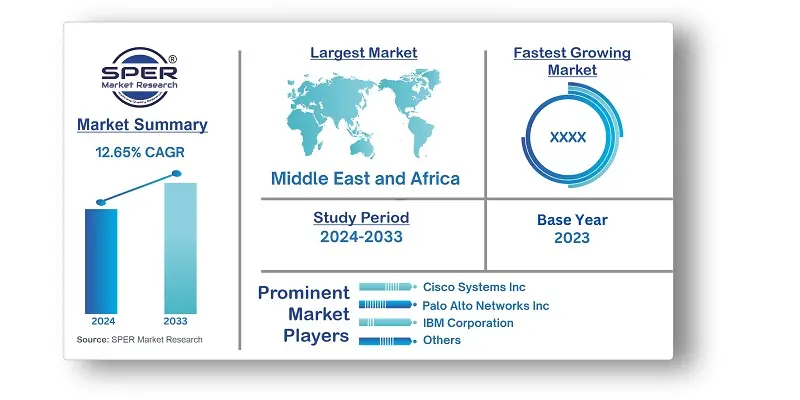
Middle East and Africa Cybersecurity Market Trends, Share, Demand, Revenue and Future Outlook
Middle East and Africa Cybersecurity Market Growth, Size, Trends Analysis- By Security Type, By Enterprise Size, By Industry- Regional Outlook, Competitive Strategies and Segment Forecast to 2033
| Published: Nov-2024 | Report ID: IACT24191 | Pages: 1 - 158 | Formats*: |
| Category : Information & Communications Technology | |||
- 2024: Cisco announced the opening of a new local cloud data center in the UAE for its Duo multifactor authentication (MFA) and secure access solution to support cybersecurity readiness.
- In March 2023, CYMAR Management Ltd. teamed up with Saiber Innovation Technologies, a Smart Port technology business, to expand the need for cyber insurance in the UAE's international logistics and maritime industry. Through this agreement, the sector that is most at risk from cyberattacks will have its demanding cyber insurance needs met.
- In February 2023, EMTECH announced a collaboration with KnowBe4, a platform that simulates phishing attacks and offers security awareness training. Through this cooperation, EMTECH will be able to protect their IT network from human mistake in the UAE market by integrating with KnowBe4's security awareness training and simulated phishing platform capabilities.


| Report Metric | Details |
| Market size available for years | 2020-2033 |
| Base year considered | 2023 |
| Forecast period | 2024-2033 |
| Segments covered | By Security Type, By Enterprise Size, By Industry. |
| Regions covered | South Africa, Nigeria, Kenya, Ghana, United Arab Emirates, Egypt, Rest of Middle East & Africa. |
| Companies Covered | Cisco Systems Inc, Dell Technologies, Kaspersky Lab, IBM Corporation, Check Point Software Technologies Ltd, Palo Alto Networks Inc, Broadcom Inc, Trend Micro Inc, FireEye Inc. |
- Government and Defense Organizations
- Financial Institutions and Banks
- IT and Telecom Companies
- Energy and Utilities Sector
- Healthcare Organizations
- Retail and E-commerce Companies
- Manufacturing and Industrial Enterprises
- Educational Institutions
- Transportation and Logistics Companies
- Media and Entertainment Companies
| By Security Type: | |
| By Enterprise Size: | |
| By Industry: |
- Middle East & Africa Cybersecurity Market Size (FY’2024-FY’2033)
- Overview of Middle East & Africa Cybersecurity Market
- Segmentation of Middle East & Africa Cybersecurity Market By Security Type (Network Security, Cloud Application Security, End-point Security, Secure Web Gateway, Application Security, and Others)
- Segmentation of Middle East & Africa Cybersecurity Market By Enterprise Size (Small & Medium-sized Enterprises and Large Enterprises)
- Segmentation of Middle East & Africa Cybersecurity Market By Industry (BFSI, IT and Telecommunications, Retail, Healthcare, Government, Manufacturing, Travel and Transportation, Energy and Utilities, and Others)
- Statistical Snap of Middle East & Africa Cybersecurity Market
- Expansion Analysis of Middle East & Africa Cybersecurity Market
- Problems and Obstacles in Middle East & Africa Cybersecurity Market
- Competitive Landscape in the Middle East & Africa Cybersecurity Market
- Impact of COVID-19 and Demonetization on Middle East & Africa Cybersecurity Market
- Details on Current Investment in Middle East & Africa Cybersecurity Market
- Competitive Analysis of Middle East & Africa Cybersecurity Market
- Prominent Players in the Middle East & Africa Cybersecurity Market
- SWOT Analysis of Middle East & Africa Cybersecurity Market
- Middle East & Africa Cybersecurity Market Future Outlook and Projections (FY’2024-FY’2033)
- Recommendations from Analyst
1.1. Scope of the report1.2. Market segment analysis
2.1. Research data source
2.1.1. Secondary Data2.1.2. Primary Data2.1.3. SPERs internal database2.1.4. Premium insight from KOLs
2.2. Market size estimation
2.2.1. Top-down and Bottom-up approach
2.3. Data triangulation
4.1. Driver, Restraint, Opportunity and Challenges analysis
4.1.1. Drivers4.1.2. Restraints4.1.3. Opportunities4.1.4. Challenges
4.2. COVID-19 Impacts of the Middle East & Africa Cybersecurity Market.
5.1. SWOT Analysis
5.1.1. Strengths5.1.2. Weaknesses5.1.3. Opportunities5.1.4. Threats
5.2. PESTEL Analysis
5.2.1. Political Landscape5.2.2. Economic Landscape5.2.3. Social Landscape5.2.4. Technological Landscape5.2.5. Environmental Landscape5.2.6. Legal Landscape
5.3. PORTERs Five Forces
5.3.1. Bargaining power of suppliers5.3.2. Bargaining power of buyers5.3.3. Threat of Substitute5.3.4. Threat of new entrant5.3.5. Competitive rivalry
5.4. Heat Map Analysis
6.1. Middle East & Africa Cybersecurity Market Manufacturing Base Distribution, Sales Area, Product Type6.2. Mergers & Acquisitions, Partnerships, Product Launch, and Collaboration in Middle East & Africa Cybersecurity Market
7.1. Middle East & Africa Cybersecurity Market Size, Share and Forecast, By Security Type, 2020-20267.2. Middle East & Africa Cybersecurity Market Size, Share and Forecast, By Security Type, 2027-20337.3. Network Security7.4. Cloud Application Security7.5. End-point Security7.6. Secure Web Gateway7.7. Application Security7.8. Others
8.1. Middle East & Africa Cybersecurity Market Size, Share and Forecast, By Enterprise Size, 2020-20268.2. Middle East & Africa Cybersecurity Market Size, Share and Forecast, By Enterprise Size, 2027-20338.3. Small & Medium Enterprises (SMEs)8.4. Large Enterprises
9.1. Middle East & Africa Cybersecurity Market Size, Share and Forecast, By Industry, 2020-20269.2. Middle East & Africa Cybersecurity Market Size, Share and Forecast, By Industry, 2027-20339.3. BFSI9.4. IT and Telecommunications9.5. Retail9.6. Healthcare9.7. Government9.8. Manufacturing9.9. Travel and Transportation9.10. Energy and Utilities9.11. Others
10.1. Middle East & Africa Cybersecurity Market Size and Market Share
11.1. Middle East & Africa Cybersecurity Market Size and Market Share By Region (2020-2026)11.2. Middle East & Africa Cybersecurity Market Size and Market Share By Region (2027-2033)11.3. South Africa11.4. Nigeria11.5. Kenya11.6. Ghana11.7. United Arab Emirates11.8. Egypt11.9. Rest of Middle East & Africa
12.1. Cisco Systems Inc
12.1.1. Company details12.1.2. Financial outlook12.1.3. Product summary12.1.4. Recent developments
12.2. Dell Technologies
12.2.1. Company details12.2.2. Financial outlook12.2.3. Product summary12.2.4. Recent developments
12.3. Kaspersky Lab
12.3.1. Company details12.3.2. Financial outlook12.3.3. Product summary12.3.4. Recent developments
12.4. IBM Corporation
12.4.1. Company details12.4.2. Financial outlook12.4.3. Product summary12.4.4. Recent developments
12.5. Check Point Software Technologies Ltd
12.5.1. Company details12.5.2. Financial outlook12.5.3. Product summary12.5.4. Recent developments
12.6. Palo Alto Networks Inc
12.6.1. Company details12.6.2. Financial outlook12.6.3. Product summary12.6.4. Recent developments
12.7. Broadcom Inc
12.7.1. Company details12.7.2. Financial outlook12.7.3. Product summary12.7.4. Recent developments
12.8. Trend Micro Inc
12.8.1. Company details12.8.2. Financial outlook12.8.3. Product summary12.8.4. Recent developments
12.9. FireEye Inc
12.9.1. Company details12.9.2. Financial outlook12.9.3. Product summary12.9.4. Recent developments
12.10. Others
SPER Market Research’s methodology uses great emphasis on primary research to ensure that the market intelligence insights are up to date, reliable and accurate. Primary interviews are done with players involved in each phase of a supply chain to analyze the market forecasting. The secondary research method is used to help you fully understand how the future markets and the spending patterns look likes.
The report is based on in-depth qualitative and quantitative analysis of the Product Market. The quantitative analysis involves the application of various projection and sampling techniques. The qualitative analysis involves primary interviews, surveys, and vendor briefings. The data gathered as a result of these processes are validated through experts opinion. Our research methodology entails an ideal mixture of primary and secondary initiatives.



Frequently Asked Questions About This Report
PLACE AN ORDER
Year End Discount
Sample Report
Pre-Purchase Inquiry
NEED CUSTOMIZATION?
Request CustomizationCALL OR EMAIL US
100% Secure Payment






Related Reports
Our Global Clients
Our data-driven insights have influenced the strategy of 200+ reputed companies across the globe.






















